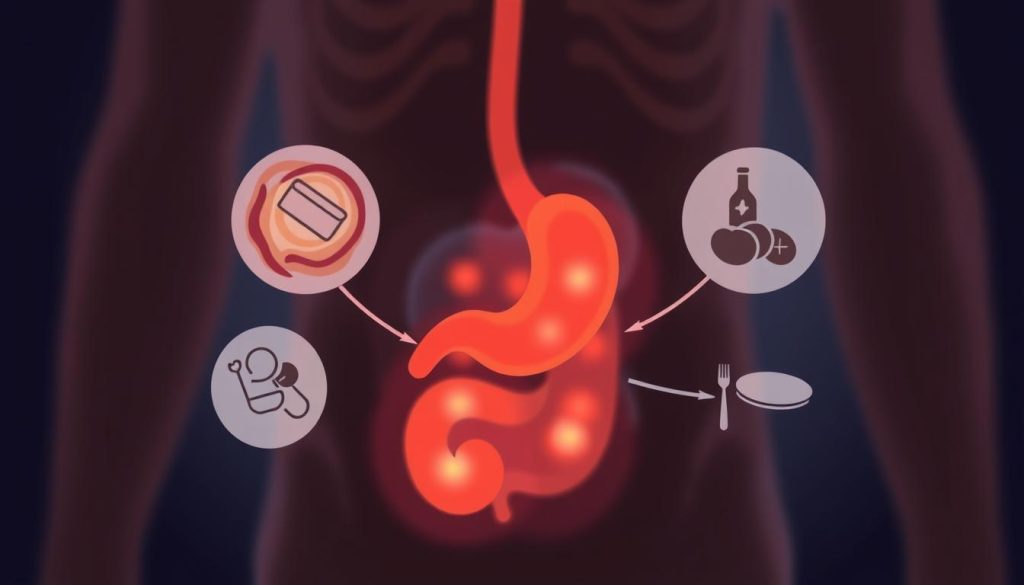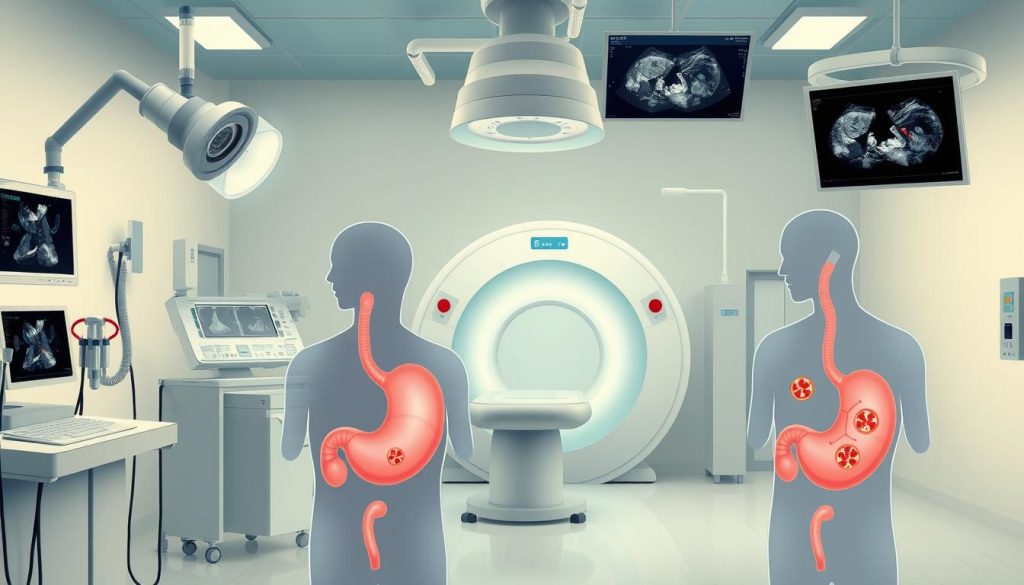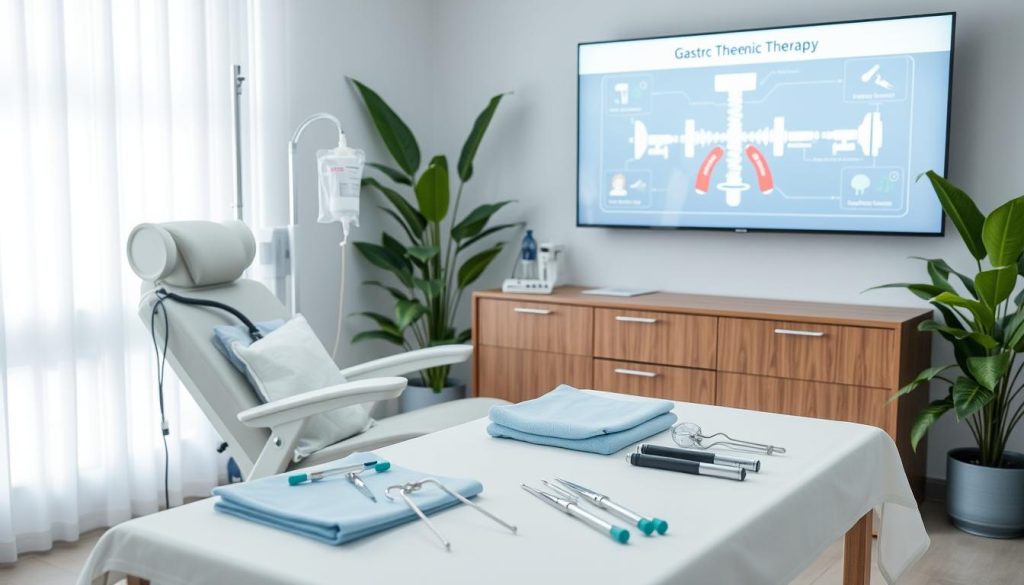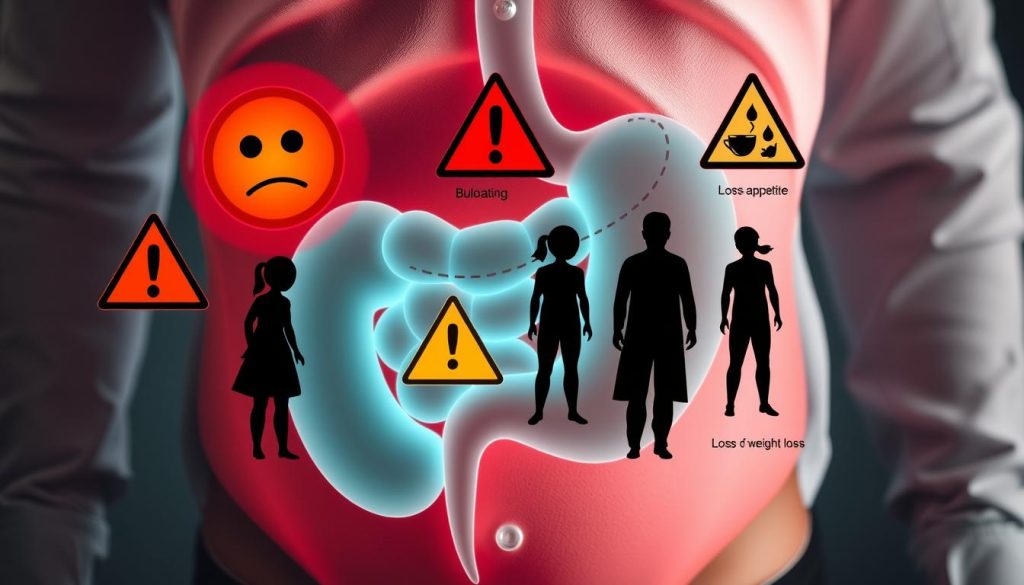Stomach cancer is a serious health issue that often goes unnoticed in its early stages. Knowing the gastric cancer symptoms is key to catching it early. This guide helps you understand the warning signs, so you can take care of your health.
Stomach cancer can show up in many ways, from ongoing digestive problems to unexpected weight loss. By recognizing these signs, you can get medical help sooner. Let’s look at the early signs, risk factors, and how to diagnose this tough disease.
Understanding Stomach Cancer: Types and Development
Stomach cancer is a serious issue affecting thousands of Americans each year. It comes in different types. Knowing about these can help in catching it early and treating it.
What is Gastric Adenocarcinoma
Gastric adenocarcinoma is the most common stomach cancer. It begins in the stomach’s lining cells. This type makes up about 95% of stomach tumors. It can grow slowly, often without symptoms at first.
Different Types of Gastric Carcinoma
Gastric carcinoma has several subtypes. Each type behaves differently and may need a special treatment:
- Intestinal type: Forms gland-like structures
- Diffuse type: Spreads throughout the stomach wall
- Mixed type: Shows features of both intestinal and diffuse types
- Signet ring cell: Named for its ring-shaped appearance under a microscope
How Stomach Tumors Develop
Stomach tumors often start as small changes in the stomach lining. Over time, these changes can grow into cancer. Diet, smoking, and genetics can influence tumor development. Knowing these factors can help prevent and detect gastric carcinoma early.
| Stage | Description | 5-Year Survival Rate |
|---|---|---|
| Early | Cancer limited to inner layers of stomach | 68% |
| Locally Advanced | Cancer has spread to deeper layers or nearby lymph nodes | 31% |
| Metastatic | Cancer has spread to distant parts of the body | 5% |
Common Early Symptoms of Stomach Cancer
Spotting stomach cancer symptoms early is key for quick treatment. Some signs might seem small, but they’re important. Here are the early signs of stomach cancer everyone should know.

Stomach discomfort is often the first sign. Many feel persistent indigestion or a burning feeling in their upper stomach. These feelings can get worse after eating or when lying down.
Unexplained nausea or vomiting, possibly with blood, is another warning. Changes in appetite are also a red flag. You might feel full quickly or lose interest in food, leading to weight loss.
| Early Warning Signs | Description |
|---|---|
| Abdominal Pain | Persistent discomfort in the upper stomach area |
| Appetite Changes | Feeling full quickly or loss of appetite |
| Nausea/Vomiting | Frequent upset stomach, sometimes with blood |
| Weight Loss | Unexplained decrease in body weight |
| Swallowing Issues | Difficulty or pain when swallowing food |
If you see any of these symptoms lasting more than a few weeks, see a doctor. Early detection can greatly improve treatment results. Remember, these signs don’t always mean cancer, but they need medical check-up.
Persistent Digestive Issues as Warning Signs
Gastric cancer symptoms often show up as ongoing digestive problems. These signs can be hard to spot early. It’s key to know them to act fast.
Chronic Indigestion and Heartburn
Heartburn or indigestion that keeps coming back might mean something serious. If it lasts for weeks, seeing a doctor is a good idea. Learn more about it here. Even if it’s not cancer, it could be a sign of another problem.
Changes in Appetite
Not wanting to eat or avoiding certain foods is a red flag. If you suddenly don’t enjoy foods you used to love, listen to your body. It might be trying to tell you something.
Feeling Full After Small Meals
Feeling too full after eating a little is a sign of stomach trouble. This feeling, called early satiety, could mean there’s a problem. Keep track of any changes in how you eat and talk to your doctor about them.
These symptoms don’t always mean cancer. Many things can cause similar problems. But if you keep having issues, get medical help. Catching gastric cancer early can make a big difference in treatment.
Unexplained Weight Loss and Physical Changes
Unexplained weight loss is a key symptom of gastric cancer. Many people lose weight suddenly, even if they haven’t changed their diet or exercise. This weight loss can happen quickly, in just weeks or months.

The body’s response to cancer causes this weight loss. Tumors in the stomach can affect digestion and nutrient absorption. They can also speed up metabolism, burning calories faster. Some people feel full quickly, eating less.
Other physical changes can also hint at stomach cancer:
- Muscle wasting, mainly in arms and legs
- Skin becoming pale or yellowing
- Swelling in the abdomen or extremities
While weight loss can point to gastric cancer, it’s not always the case. Many other health issues can cause similar symptoms. If you notice significant, unintentional weight loss and other symptoms, see a doctor right away. They can evaluate and diagnose you properly.
Pain Patterns and Discomfort Signals
Spotting gastric cancer symptoms early is key for quick treatment. Abdominal pain is a major sign. Let’s look at the types of pain linked to stomach cancer.
Upper Abdominal Pain Location
Pain usually shows up in the upper belly, just below the chest. This spot, called the epigastric region, is where the stomach sits. The pain can feel dull or sharp, and it might come and go.
Pain Characteristics and Timing
Pain from stomach cancer often gets worse after eating or drinking. It might start off mild but gets more intense. Taking antacids can help, but only for a short time. Pain that happens at night is a big warning sign.
Associated Symptoms
Abdominal pain is not the only symptom. Other signs of gastric cancer include:
- Nausea or vomiting
- Bloating or feeling full quickly
- Difficulty swallowing
- Unexplained weight loss
| Pain Type | Description | Concern Level |
|---|---|---|
| Persistent | Lasts for weeks | High |
| Worsening | Increases in intensity over time | High |
| Nocturnal | Disrupts sleep | Moderate to High |
| Post-meal | Occurs after eating | Moderate |
If you have ongoing belly pain or other symptoms, see a doctor fast. Catching gastric cancer early can make a big difference.
Blood-Related Warning Signs

Blood-related issues are alarming signs of gastric cancer. Seeing blood in your stool or vomit means you should see a doctor fast. These signs could mean a serious problem, like stomach cancer.
Dark, tarry stools often mean bleeding in the upper digestive tract. This could be from stomach ulcers or tumors. Fresh, bright red blood in the stool usually comes from lower in the digestive system. But it’s a big worry.
Vomiting blood is another warning sign. It might look bright red or like coffee grounds if it’s been in the stomach for a while. This symptom can happen when stomach tumors bleed.
- Dark, tarry stools
- Bright red blood in stool
- Vomiting blood or ‘coffee ground’ material
Remember, blood in stool doesn’t always mean cancer. It could be from less serious issues like hemorrhoids or ulcers. But it’s smart to check with a doctor to rule out serious problems.
If you see any blood-related symptoms, don’t hesitate. Book a doctor’s appointment right away. Catching problems early can greatly improve treatment for stomach cancer and other digestive issues.
Risk Factors for Developing Gastric Cancer
It’s important to know the risk factors for gastric cancer to catch it early. Stomach cancer can come from many things, like genes, lifestyle, and health conditions.
Genetic Predisposition
Some people are more likely to get stomach cancer because of their genes. For example, a gene called CDH1 can increase the risk. If your family has had stomach cancer, talk to a genetic counselor.
Lifestyle Factors
Some choices can raise your risk of stomach cancer:
- Smoking
- Drinking a lot of alcohol
- Eating too much processed and salty food
- Not eating enough fruits and veggies
Medical Conditions
Some health issues can also up your risk of gastric cancer:
| Condition | Risk Increase |
|---|---|
| Helicobacter pylori infection | Up to 6 times higher |
| Chronic atrophic gastritis | 3-6 times higher |
| Pernicious anemia | 2-3 times higher |
Knowing these risk factors can help you lower your chance of getting stomach cancer. Regular health checks and making healthy lifestyle choices are important steps.
Diagnostic Methods for Stomach Cancer
Finding stomach cancer early is key to treating it well. Doctors use many ways to spot and confirm stomach tumors. These methods help find where, how big, and how far the cancer has spread.

Endoscopy is a main tool for finding gastric cancer. A thin, flexible tube with a camera goes through the mouth to look at the stomach lining. Doctors can see odd spots and take tissue samples for biopsy during this.
Imaging tests are also important for diagnosing stomach cancer. CT scans, MRIs, and PET scans give clear pictures of the stomach and nearby organs. These tests help doctors see how far the cancer has spread and plan treatment.
Blood tests can show signs of gastric cancer. Doctors might check for anemia, which can mean there’s bleeding inside. They also look for tumor markers, proteins that might be higher in cancer patients.
| Diagnostic Method | Purpose | Procedure |
|---|---|---|
| Endoscopy | Visualize stomach lining | Camera inserted through mouth |
| CT Scan | Detailed images of stomach | X-ray imaging |
| Blood Tests | Check for anemia and tumor markers | Blood sample analysis |
These methods work together to give a full view of gastric cancer. Finding cancer early through these tests can greatly improve treatment results and patient chances of recovery.
When to Seek Medical Attention
Knowing when to see a doctor for stomach cancer symptoms is key. Quick action can help find cancer early and improve treatment. Here’s how to get the right care on time.
Urgent Warning Signs
Don’t ignore these signs that might mean stomach cancer:
- Severe abdominal pain that doesn’t go away
- Vomiting blood or passing black, tarry stools
- Unexplained rapid weight loss
- Difficulty swallowing or feeling full quickly
Making a Doctor’s Appointment
If symptoms last, make a doctor’s appointment. Get ready by:
- Keeping a symptom diary
- Listing all medications and supplements you take
- Gathering your family medical history
Questions for Your Healthcare Provider
Ask these questions at your appointment:
- What tests do I need to rule out stomach cancer?
- Could my symptoms be caused by something other than cancer?
- How soon can I get test results?
- What’s the next step if my tests are concerning?
Remember, seeing a doctor early can greatly help with stomach cancer. Trust your gut and contact your doctor with any worries.
Treatment Options and Approaches
Patients with stomach cancer have several treatment options. The choice depends on the cancer stage, location, and overall health. Gastric cancer treatment often involves a mix of approaches to effectively target the disease.

Surgery is a main option for many stomach cancer cases. Doctors might remove part or all of the stomach and nearby lymph nodes. This procedure, called gastrectomy, aims to remove visible tumors and stop them from spreading.
Chemotherapy uses drugs to kill cancer cells in the body. It’s often used before surgery to shrink tumors or after surgery to destroy any remaining cancer cells. For advanced stomach cancer, chemotherapy is often the main treatment.
Radiation therapy uses high-energy beams to target and destroy cancer cells. It’s often combined with chemotherapy, either before or after surgery, to improve treatment results.
Targeted therapies focus on specific cancer cell features, reducing damage to healthy cells. These innovative treatments show promise in managing certain types of stomach cancer.
Immunotherapy boosts the body’s natural defenses to fight cancer. It’s an emerging option for some stomach cancer patients, mainly those with advanced disease.
Your healthcare team will create a personalized treatment plan for you. They’ll consider your cancer stage, overall health, and personal preferences. This helps determine the most effective approach for your stomach cancer journey.
Understanding Gastrectomy and Surgical Procedures
Gastric cancer surgery often involves a procedure called gastrectomy. This operation removes part or all of the stomach to treat stomach cancer. The type of gastrectomy depends on the cancer’s location and stage.
Types of Gastric Surgery
Surgeons perform different types of gastrectomy based on the patient’s needs:
- Partial gastrectomy: Removes part of the stomach
- Total gastrectomy: Removes the entire stomach
- Sleeve gastrectomy: Creates a narrow tube from the stomach
Recovery Expectations
After gastric cancer surgery, patients usually stay in the hospital for 5-8 days. Full recovery can take 6-8 weeks. During this time, patients gradually return to normal activities and adjust to dietary changes.
Post-Surgery Care
Proper care after gastrectomy is key for recovery:
- Follow a specialized diet plan
- Take prescribed supplements
- Attend follow-up appointments
- Monitor for complications
- Engage in gentle physical activity as advised
Understanding the gastrectomy process helps patients prepare for surgery and recovery. With proper care and support, many people adjust well to life after gastric cancer surgery.
Lifestyle Changes After Diagnosis
Getting a gastric cancer diagnosis can feel overwhelming. But, making positive lifestyle changes can greatly improve your life. These changes include better nutrition, more physical activity, and taking care of your emotional health.
Changing your diet is key in managing gastric cancer. Work with a nutritionist to make a meal plan that fits your needs. Eating small, frequent meals can be easier than big ones. Also, choose foods that are full of nutrients and drink plenty of water all day.
Being active is important to keep your strength up and fight off tiredness. Start with easy exercises like walking or swimming. As you get stronger, you can do more. Always talk to your doctor before starting any new exercise.
It’s also important to take care of your emotional health. Joining a support group can help you connect with others who understand what you’re going through. Activities like meditation or yoga can also help you deal with stress and anxiety from treatment.
- Eat small, frequent meals
- Stay hydrated
- Engage in gentle exercise
- Join a support group
- Practice stress-reduction techniques
Remember, everyone’s journey with gastric cancer is different. Work closely with your healthcare team to create a plan that fits your needs. This will help you navigate these lifestyle changes well.
Prevention Strategies and Risk Reduction
By taking proactive steps, you can greatly reduce your risk of gastric cancer. Making smart choices can protect your health and lower your risk of this serious disease.
Dietary Modifications
Eating a balanced diet is key to preventing gastric cancer. Eat lots of fresh fruits, vegetables, and whole grains. Try to avoid processed meats and foods with too much salt.
Adding foods high in antioxidants, like berries and leafy greens, can also help. These foods protect your stomach lining.
Lifestyle Adjustments
Changing your daily habits can also help. Quit smoking and drink less alcohol. Stay active to keep a healthy weight.
These changes help prevent stomach cancer and improve your overall health.
Regular Screening
If you’re at higher risk, regular screenings are vital. Talk to your doctor about your family history and risk factors. They can help decide when you should get screened.
Tests like endoscopies can find problems early. This increases your chances of successful treatment.
By following these steps, you’re taking charge of your health. Remember, even small changes can make a big difference in reducing your risk of gastric cancer. Stay informed, make smart choices, and focus on your well-being.
Support Systems and Resources
Living with stomach cancer can feel overwhelming. But, you’re not alone. A strong support network can greatly help your journey. Let’s look at some valuable resources for patients and their loved ones.
Support groups are a safe place to share and learn. Many hospitals and cancer centers have in-person meetings. Online communities offer 24/7 support to connect with others facing similar challenges.
Counseling services can help with emotional stress. Licensed therapists who specialize in cancer care offer sessions for individuals and families. Some organizations even offer free or low-cost counseling for cancer patients.
| Support Resource | Description | How to Access |
|---|---|---|
| American Cancer Society | Information, support groups, and helpline | Website, local offices, 24/7 helpline |
| Cancer Support Community | Online forums, educational resources | Website, toll-free helpline |
| CancerCare | Counseling, support groups, financial assistance | Website, phone, email |
Financial assistance programs can help with treatment costs and living expenses. Social workers at your hospital can guide you to local resources. National organizations like the Patient Advocate Foundation offer financial counseling and assistance.
Remember, seeking support is a sign of strength. These stomach cancer support resources can offer comfort, practical help, and a sense of community during your treatment journey.
Latest Research and Treatment Developments
The field of gastric cancer treatment is changing fast. New discoveries are giving patients hope. Researchers are looking into therapies that target specific genetic mutations in stomach cancer cells. These personalized treatments aim to be more effective and have fewer side effects.
Immunotherapy is a big step forward in treating gastric cancer. Trials are testing immune checkpoint inhibitors. These help the body’s immune system fight cancer cells better. Early signs show they could lead to longer survival for some patients with advanced stomach cancer.
Researchers are also looking at combining old treatments with new ones. For example, they’re studying how chemotherapy works better with targeted drugs or immunotherapy. This could lead to more effective treatments for gastric cancer.
New technologies are being explored for diagnosing and treating gastric cancer. Liquid biopsies could help catch cancer early. Robotic-assisted surgeries might make tumor removal more precise. These advancements could greatly improve patient outcomes and quality of life.
FAQ
Q: What are the early warning signs of stomach cancer?
A: Signs of stomach cancer include persistent indigestion and trouble swallowing. You might also feel full quickly or lose weight without trying. Abdominal pain or discomfort and blood in stool or vomit are other signs. But, these symptoms can also mean other health issues, so see a doctor for a proper check-up.
Q: What is gastric adenocarcinoma?
A: Gastric adenocarcinoma is the most common stomach cancer, making up 90-95% of cases. It starts in the glandular cells of the stomach lining. If not treated, it can spread to other parts of the body.
Q: How do stomach tumors develop?
A: Stomach tumors grow from cells in the stomach lining that change genetically. This can happen due to H. pylori infection, chronic inflammation, diet, and genetics.
Q: What are the risk factors for developing gastric cancer?
A: Risk factors include being over 50, male, and having H. pylori infection. Family history, smoking, heavy drinking, and certain diets also increase risk. Conditions like chronic gastritis or pernicious anemia are also factors.
Q: How is stomach cancer diagnosed?
A: Doctors use upper endoscopy with biopsy, imaging tests, and blood tests to diagnose stomach cancer. An endoscopy lets doctors see the stomach lining and take tissue samples.
Q: What is a gastrectomy?
A: A gastrectomy is surgery to remove part or all of the stomach. It’s a common treatment for stomach cancer. The surgery’s extent depends on the cancer’s stage and location. There are different types of gastrectomy.
Q: What are the treatment options for stomach cancer?
A: Treatments include surgery, chemotherapy, radiation, targeted therapy, and immunotherapy. The choice depends on the cancer’s stage, location, and the patient’s health. Often, a mix of treatments is used for the best results.
Q: What lifestyle changes are recommended after a stomach cancer diagnosis?
A: After a diagnosis, eat a nutrient-rich diet and eat smaller, more frequent meals. Stay hydrated, quit smoking, and limit alcohol. Regular, moderate exercise is also recommended. Work with your healthcare team to create a personalized plan.
Q: What are the latest developments in stomach cancer research?
A: Research has made progress in immunotherapy, targeted therapies, and personalized medicine. New screening methods, biomarkers for early detection, and innovative surgeries are being explored. These advancements aim to improve patient outcomes.
Q: What is the survival rate for stomach cancer?
A: Survival rates vary based on the stage at diagnosis and other factors. The American Cancer Society reports a 5-year survival rate of about 32% for stomach cancer in the U.S. Early detection can increase this rate to 70%. Remember, these are general statistics, and individual results can differ.


















